City guides


The South West Travel Guide
The southwest region of England is picture-perfect, conforming to the stereotype many have of the English countryside with its rolling green hills, wild moors, quaint historic towns and rugged coastlines. It is no wonder that Romantic poets such as William Wordsworth and Samuel Taylor Coleridge drew inspiration from the area.
Devon and Cornwall, on the tip of Southwest England, boast some of the most spectacular and unspoilt scenery in the country. The south coast of Devon is known as the English Riviera, and in its major town, Plymouth, the famous naval docks are still home to the Royal Navy. It was here in 1588 that Sir Francis Drake finished his game of bowls before setting off to defeat the Spanish Armada. A few years later, in 1620, the Mayflower embarked from Plymouth to the New World carrying the original pilgrim settlers.
On the border with Cornwall, visitors will discover the rugged wilderness of Dartmoor National Park, where wild ponies and hikers roam freely across a dramatic landscape dotted with 'tors' and prehistoric remains. England's most south westerly county, Cornwall is a popular destination for British tourists drawn by the beautiful countryside and a craggy coastline pitted with small fishing villages and glorious white sandy beaches.
Southwest England is filled with fascinating sights and sounds, from small towns to vibrant cities, and from stately cathedrals to Neolithic sites, all set in the lush English countryside. The region is a must on any trip to the UK and visitors will not be disappointed.
Things to do in The South West
The gorgeous natural scenery ensures that visitors to Southwest England are often content to ramble along rugged cliff walks on the coast or explore the wild moors of the region for the majority of their holiday. This appreciation of some of the country's most breathtaking and beloved landscapes is best interspersed with visits to quaint coastal villages and cosy pubs, especially in Devon and Cornwall.
Southwest England is also home to some fascinating historical sites, including the legendary Stonehenge and the mysterious Avebury Stone Circle, both in Wiltshire, as well as dozens of slightly younger abbeys and cathedrals, including the beautiful Salisbury Cathedral. The dramatic cliff-top castle ruin of Tintagel also draws many visitors, at least partly because popular legend decrees that it is the birthplace of King Arthur.
Since 1970, the Glastonbury Festival has drawn thousands of music lovers to a farm just outside the town of Glastonbury in Somerset to enjoy hundreds of top artists, as well as theatre, comedy, artwork and more. While best known for its music festivals and cheddar cheese, Somerset also boasts sites such as the Exmoor National Park and Cheddar Gorge with its myriad caves. The region supplies visitors with numerous opportunities for cultural, historic, gastronomic and outdoor activities and experiences to suit a multitude of interests.
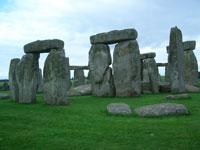
Stonehenge
No other site in England presents the viewer with such grandeur and mystery, nor sparks the imagination so much as this iconic circle of stones in Wiltshire, southwest England. Writers, adventurers, historians, and conquerors have all tried to answer its mysteries, resulting in tales and fables of Druids, Merlin and King Arthur, ancient giants roaming the countryside, and a highly evolved prehistoric race of men. Yet the question of who managed to drag several 20-ton stones more than 240 miles (386km) from North Wales across steep hills to be aligned with mathematical and astronomical precision 5,000 years ago remains fairly unanswered. A must-see tourist sight in England, travellers should budget a full day to see Stonehenge and its Visitor's Centre properly. The stone circle is located just off the A303, 20 minutes' drive from Salisbury.
The Eden Project
The Eden Project's aim is to examine the ways in which human beings interact with their environment, with a special focus on the plant world, in order to develop new ways of sustainable development by spearheading new conservation methods. Owned by a charity called the Eden Trust, the project consists of several specially created conservatories (the largest in the world) built into a giant crater in Cornwall. The Eden Project is more than a theme park, as it presents visitors with an opportunity to explore the plant kingdom, and to examine our dependence on it. The park also hosts concerts during the summer, with top international acts regularly featuring on the bill. The Eden Project is one of the most popular tourist destinations in the UK, outside of London, and is well worth a visit.
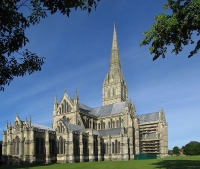
Salisbury Cathedral
The city of Salisbury is dominated by the spire of its famous cathedral, the tallest in England at 404 feet (123m). Started in 1220, the cathedral was completed in 1258, and the Spire added a few years later. Built to reflect the glory of God in stone and glass, this majestic and awe-inspiring church has been a setting for many great occasions in its 775-year history. The grounds of the cathedral contain many notable houses, which are open to the public. Mompesson House is a perfectly preserved 18th-century home, and Malmesbury House was once the sanctuary of King Charles II, fleeing the Battle of Worcester in the 17th century. Salisbury Cathedral is one of England's greatest old churches and historic pilgrimage sites and is well worth a visit for tourists.
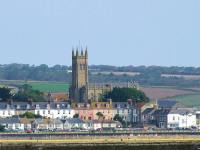
Penzance
Penzance is home to much more than Gilbert and Sullivan's famous pirates, though it has a long association with the arts and continues to be a centre for art and music in Cornwall. Originally a market and fishing town, Penzance has a bustling harbour area with a Victorian promenade that features an art deco open-air swimming pool. Although many of the historic buildings in Penzance have been pulled down, there are still worthwhile sights like the Egyptian House, St Mary's Church, and the Union Hotel. Morrab Gardens are a pleasant setting to spend an afternoon in good weather. Penzance is also beautifully situated in a region with bucket-loads of natural charm.
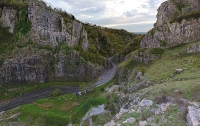
Cheddar Gorge
Attracting about 500,000 visitors a year, southwest England's spectacular Cheddar Gorge makes a wonderful daytrip destination, guaranteed to delight lovers of the great outdoors. The limestone gorge, located at the southern end of the Mendip Hills, near the village of Cheddar in Somerset, has been named Britain's 'second-greatest natural wonder' (after the Dan yr Ogof caves in Wales), and plays host to a variety of attractions and activities. For the cost of admission, visitors gain access to the exciting Cliff-Top Gorge Walk; the spellbinding Gough's Cave, full of stalactites and stalagmites; and the Museum of Prehistory, where the oldest skeleton in Britain (the 'Cheddar Man', who is believed to be about 9,000 years old) can be viewed. There's also a thrilling Crystal Quest feature, which is sure to delight the young ones, consisting of a cave filled with models of mythical and magical beings. A highly recommended tourist attraction, Cheddar Gorge makes a wonderful day excursion for visitors to southwest England.
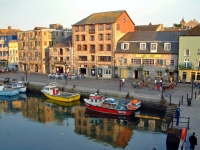
Plymouth
The historic port city of Plymouth is located on the Devon coast, about 190 miles (310km) southwest of London, and has been attracting both local and international holidaymakers for centuries. Dating back to the Bronze Age, this port's history has seen it function as a trading post during the height of the Roman Empire, and then as a departure point for the Mayflower, bearing pilgrims across the Atlantic. Plymouth's naval background is still evident in the city's shipbuilding industry, but the economy is also largely influenced by tourism and service-based businesses, the well-established facilities and infrastructure creating an appealing environment for visitors. There are ferries to and from Plymouth linking the city to France and Spain, and the city's airport supports a number of international flights. There are many historic attractions in Plymouth to enjoy, including the 17th-century Royal Citadel and Smeaton's Tower lighthouse, built in 1759. Visitors can stroll along the many cobbled streets of the Barbican, and read the memorial plaques on the Mayflower Steps in Sutton Pool, from which the famous pilgrims' voyage was launched. The National Marine Aquarium and Crownhill Fort are also great local attractions. Plymouth is a good base for excursions to Dartmoor National Park, the Tamar Valley and the popular surfing beaches of southeast Cornwall.
United Kingdom travel info
Electricity
The electrical current in the UK is 240 volts, 50Hz. Flat, three-pin plugs are standard.
Language
English is the official language, though visitors will be astonished by the variety of regional accents.
Money
The currency is the British pound (GBP), which is divided into 100 pence. ATMs are available in almost all towns and Visa, MasterCard and American Express are widely accepted. Foreign currency can be exchanged at bureaux de change and large hotels, though better exchange rates are likely to be found at banks.
Tipping
Tips of 10 to 15 percent are expected in restaurants and upmarket hotels in the UK if a service charge hasn't been included. Hotel service staff receive an optional amount, while taxi drivers are usually given 10 to 15 percent of the fare. Tipping bartenders isn't expected, and tipping for other services is discretionary.
Health
There are no specific health risks associated with travel to the UK and food and water can be considered safe. The British National Health Service is excellent, and a number of countries have reciprocal health agreements with the UK including Australia, New Zealand and EU countries. Visitors from other countries such as Canada, South Africa and the United States are advised to take out comprehensive travel insurance.
Safety
It's generally safe to travel throughout the UK.
Local customs
Handshaking is customary when introduced to someone new. Smoking is banned in all enclosed public spaces, including pubs, restaurants and public transport. Queue barging is frowned upon and there is strict etiquette on escalators: stand on the right, walk on the left. Visitors may find Londoners more rushed and less friendly than locals in other parts of the country, particularly on London transport, where tourists are often the only people who talk.
Doing business
The four countries of the United Kingdom, although culturally and historically different, generally keep to the same business practices. Politeness and punctuality are key to good business relations and initial meetings are often conducted formally and impersonally, becoming more open and social as things progress. Business cards are exchanged at introductions, and dress is formal with dark suits preferred. Business hours are generally 8am to 5pm Monday to Friday with an hour taken at lunch.
The communication style can be difficult to adjust to: the British people respect politeness to a point that often obscures their ability to say exactly what they mean. As a result, travelling business people may need to learn to 'read between the lines' and to take cues from tone of voice and facial expression. Humour is also an integral part of the British system of communication, and is used to diffuse a tense situation and to cultivate relationships. Foreigners should never assume that an attempt at humour undermines a person's ability to do their job, or discredits the importance they attach to a deal or negotiation. Furthermore, they shouldn't be fooled into thinking that the British propensity for irony and sarcasm equates with an informal work environment.
Foreigners should be tactful during meetings, avoid becoming emotional and illustrate their experience with the subject at hand. Performance and initiative are looked upon favourably, whereas academic pretension is given far less credence. Meetings are often used as platforms for debate, rather than moments of confirmation, so there should be no surprise if not much progress is made. Foreigners should be sure to respect and appeal to all parties involved, as the British have recently begun to take a far flatter approach to management and the responsibility of decision-making. And if things go well, it's worth purchasing a pint or two for clients or colleagues; though gifts are borderline inappropriate, a round of drinks will rarely be refused.
Duty free
Travellers can bring the following goods into the UK tax or duty free: 200 cigarettes, 100 cigarillos, 50 cigars or 250g of tobacco, 18 litres of still table wine, 42 litres of beer, 4 litres of spirits or strong liqueurs or 9 litres of fortified wine, sparkling wine or other alcoholic beverages of less than 22 per cent volume.
Communications
The international country dialling code for the UK is +44. Mobile phone coverage is extensive and free WiFi is widely available in pubs and coffee shops. Travellers can purchase local prepaid SIM cards for unlocked phones or use eSIMs if their cellular providers support it on their networks.
Passport & Visa
If a visa is not required, travellers should hold a return or onward ticket, and proof of funds for the duration of stay. Passports must be valid for the period of intended stay in the UK. It's highly recommended that travellers' passports have at least six months' validity remaining after the intended date of departure from their travel destination. Immigration officials often apply different rules to those stated by travel agents and official sources. For visitors who are visa exempt up to a maximum stay of six months, the period of stay will be determined by the Immigration Officer on arrival.
Entry requirements
US travellers must hold a passport that is valid for the duration of their stay; a visa is not required for stays of up to six months.
Canadian passports must be valid for at least the expected duration of the stay. No visa is required for stays of six months or less.
Australian passports must be valid for at least six months after the departure date. No visa is required for stays of six months or less.
South Africans require a valid passport and a visa for entry or transit through the UK. South African temporary passports are not recognised.
Under the Common Travel Area agreement, citizens from the UK and Ireland are not required to pass through passport control. They can travel between both countries without a valid passport if they can prove they are a valid UK or Irish national.
New Zealand nationals must hold a valid passport, but no visa is required for stays of up to six months.
Useful contacts
United Kingdom Tourism Website: www.visitbritain.com
999 (General)Embassies / consulates in other countries
British Embassy, Washington DC, United States: +1 202 588 6500.
British High Commission, Ottawa, Canada: +1 613 237 1530.
British High Commission, Canberra, Australia: +61 2 6270 6666.
British High Commission, Pretoria, South Africa: +27 12 421 7500.
British Embassy, Dublin, Ireland: +353 1 205 3700.
British High Commission, Wellington, New Zealand: +64 4 924 2888.
Embassies / consulates in United Kingdom
United States Embassy, London: +44 20 7499 9000.
Canadian High Commission, London: +44 20 7004 6000.
Australian High Commission, London: +44 20 7379 4334.
South African High Commission, London: +44 20 7451 7299.
Irish Embassy, London: +44 20 7235 2171.
New Zealand High Commission, London: +44 20 7930 8422.


